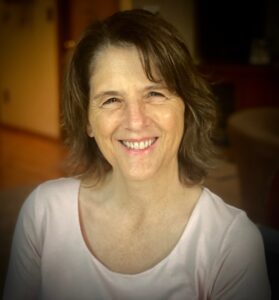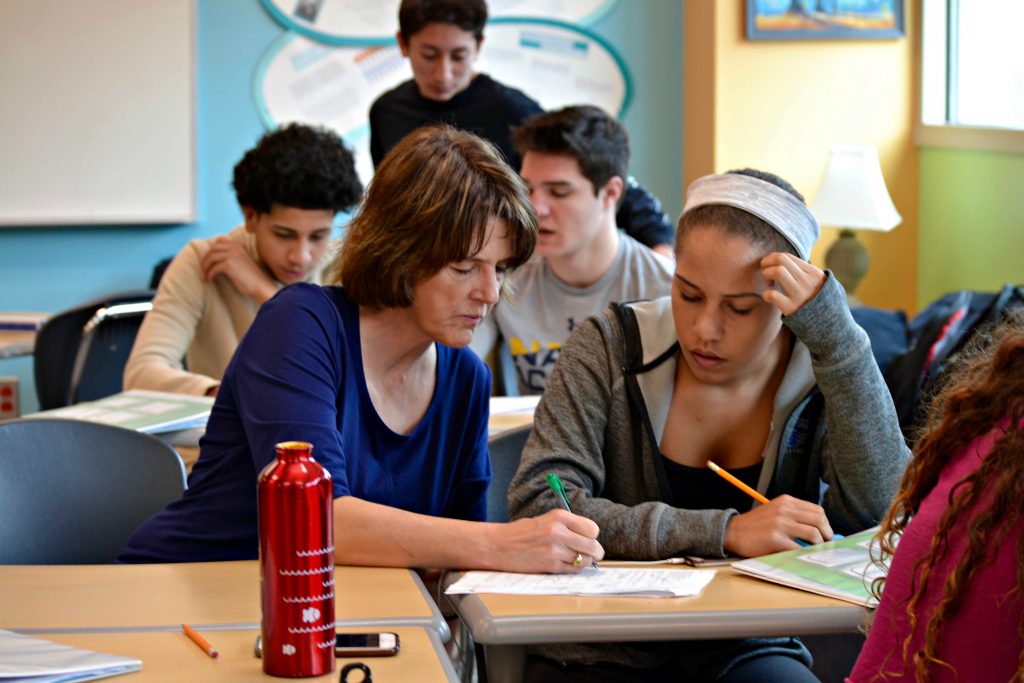
By Jo Mathis/AAPS District News Editor
Laurie Hochrein recently retired after 35 years of teaching math at Ann Arbor Public Schools. After beginning her career began at Kalamazoo Central, she went on to teach at Clague Middle School, and Huron, Pioneer and Skyline high schools—in that order.
“I view my profession not as a career, but a calling,” says Hochrein, who was a 2019 state finalist for the Presidential Award for Excellence in Mathematics & Science Teaching. “I have loved teaching and helping students see not only the beauty in mathematics but the potential for excellence that lies within themselves.”
The Petersburg, Michigan native met her husband Brian in math class at Eastern Michigan University and they’ve been married 34 years. Their sons Isaac, Daniel, and Nicholas each helped her become a better teacher, she says.
Now that she’s retired, Hochrein looks forward to reading, traveling, hiking, biking, tutoring, and spending time with friends and family.
After such a long career, we felt we couldn’t let this well-respected teacher go without asking for some words of wisdom.
What did you know about teaching toward the end of your career that you wish you had known from the start?
My philosophy for teaching and learning mathematics has evolved greatly over the past 35 years.
I’ve come to understand that learning math should be much more than memorizing a set of facts and procedures given by a teacher. I used to teach students in the traditional method of demonstration (by teacher), practice (by student), and assessment. Student participation was in the form of taking notes and asking questions and the curriculum was dictated by the textbook. This structure of learning leaves out so much that can benefit our students.
My role as a teacher is to provide rigorous multi-step problems, foster a learning environment in which students feel comfortable articulating their theories, and guide students to discovery through inquiry. I believe math is better learned in a community setting than in isolation.
One of my students said it best when she said, “Learning math in a traditional classroom had not been fun for me, but when we students were able to learn it together, relying on each other as a community, it made me love and appreciate math.” It has brought me great joy to see my students present their findings and to be able to field questions from their classmates.
I also believe it’s incredibly important that students seek a deeper meaning in the mathematical concepts and processes they learn in class. Students should often ask questions like “Why does this work?”; “What would happen if….”; “How does this compare to …”; or “Does it always work this way?” I believe curiosity should be the central part of the learning process.
How can parents help their children who think they’re bad in math to succeed nonetheless?
Students should be given opportunities each day to make conjectures and predictions, refine and/or revise these ideas through collaboration with others, and to reflect on the meaning and reasonableness of their findings.
One way that parents can help is to have their daughter or son teach them the material they’ve learned in class. Teaching another person is a powerful way to understand the material at a deeper level because they’ll need to put the concepts in their own words and be able to answer questions. Some parents might feel uncomfortable doing this because they don’t remember the concepts of high school math, but this shouldn’t matter. Getting students to talk about math will give them the opportunity to revisit and strengthen their understanding of the concepts.

When students struggle in learning math, a parent/guardian may start by asking, “What is one thing you do understand about this material?” followed by, “What is one thing that is difficult to understand?” Parents can then paraphrase and together they can write down the question(s) that can be later asked of the teacher or a classmate—or YouTube.
How do you get kids to see the relevance of math courses?
I talked a great deal in my classes about the importance and excitement of learning math. Every day.
One reason we study math is because it is a means through which we become stronger critical thinkers. To successfully learn math, students should make predictions, create logical sequences and pay attention to detail in problem solving and reflect on their solutions. These skills are transferable to virtually all areas of our lives. I firmly believe that the more consistently students are engaged in analytical activities, the better thinkers they will become.
We also learn mathematics to unveil the quantities and relationships of our world. I included applications in almost all lessons so students would see the relevance of learning math. One of the questions I frequently asked my students is “So now that we’ve learned this topic, why do we care?” which would then lead into a class discussion about purpose. We also talked a great deal about how having a strong mathematical sense, which can be developed, is empowering.
Lastly, if we view math as a challenge or a puzzle, it can be exciting, fulfilling, and fun. This might require a mind shift for some folks, for they may find mathematics intimidating. I passionately believe that all people can learn math and with that knowledge comes opportunity and enlightenment.

Be the first to comment